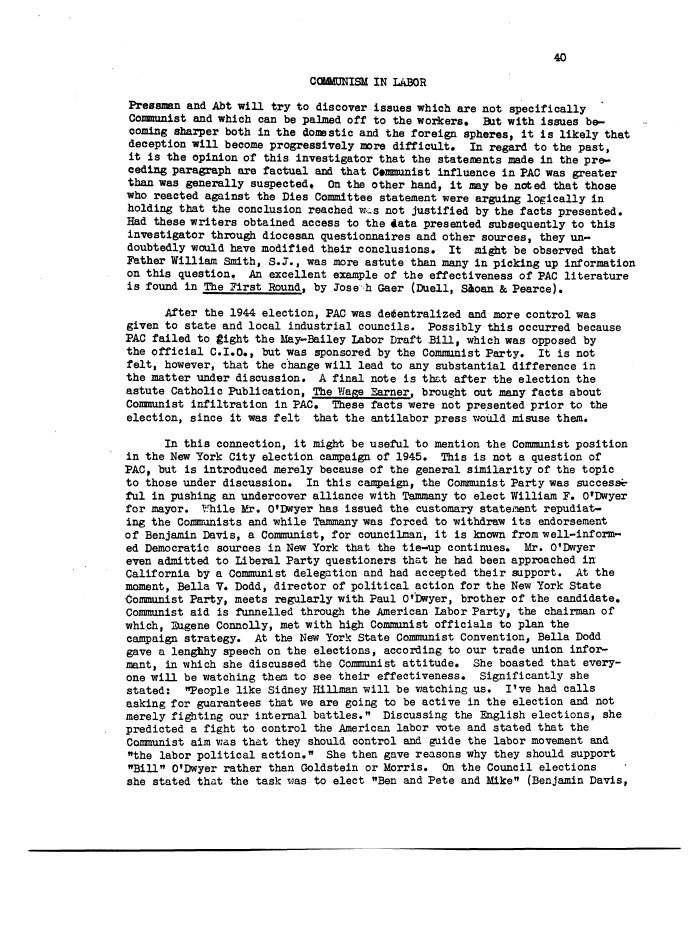 |
||||
 |
||||
| 40 COMMUNISM IN LABOR Pressman and Abt will try to discover issues which are not specifically Communist and which can be palmed off to the workers. Bat with issues be- coming sharper both in the domestic and the foreign spheres, it is likely that deception will become progressively more difficult. In regard to the past, it is the opinion of this investigator that the statements made in the pre- ceding paragraph are factual and that Ctmmunist influence in PAC was greater than was generally suspected* On the other hand, it may be noted that those who reacted against the Dies Committee statement were arguing logically in holding that the conclusion reached w_s not justified by the facts presented. Had these writers obtained access to the iata presented subsequently to this investigator through diocesan questionnaires and other sources, they un- doubtedly would have modified their conclusions. It might be observed that Father William Smith, S.J., was more astute than many in picking up information on this question, An excellent example of the effectiveness of PAC literature is found in The First Round, by Jose h Gaer (Duell, Sfltoan & Pearce). After the 1944 election, PAC was decentralized and more control was given to state and local industrial councils. Possibly this occurred because PAC failed to gight the May-Bailey Labor Draft Bill, which was opposed by the official C.I.O., but was sponsored by the Communist Party. It is not felt, however, that the change will lead to any substantial difference in the matter under discussion. A final note is that after the election the astute Catholic Publication, The Wage Earner, brought out many facts about Communist infiltration in PAC» These facts were not presented prior to the election, since it was felt that the antilabor press would misuse them. In this connection, it might be useful to mention the Communist position in the New York City election campaign of 1945. This is not a question of PAC, but is introduced merely because of the general similarity of the topic to those under discussion. In this campaign, the Communist Party was success*- ful in pushing an undercover alliance with Tammany to elect William F. O'Dwyer for mayor. ?.Thile Mr. O'Dwyer has issued the customary stateiuent repudiat- ing the Communists and while Tammany was forced to withdraw its endorsement of Benjamin Davis, a Communist, for councilman, it is known from well-inform- ed Democratic sources in New York that the tie-up continues. Mr. O'Dwyer even admitted to Liberal Party questioners that he had been approached in" California by a Communist delegation and had accepted their support. At the moment, Bella V. Dodd, director of political action for the New York State Communist Party, meets regularly with Paul O'Dwyer, brother of the candidate. Communist aid is funnelled through the American Labor Party, the chairman of which, Sugene Connolly, met with high Communist officials to plan the campaign strategy. At the New York State Communist Convention, Bella Dodd gave a lengthy speech on the elections, according to our trade union infor- mant, in which she discussed the Communist attitude. She boasted that every- one will be watching them to see their effectiveness. Significantly she stated: "People like Sidney Hillman will be watching us. I've had calls asking for guarantees that we are going to be active in the election and not merely fighting our internal battles.n Discussing the English elections, she predicted a fight to control the American labor vote and stated that the Communist aim was that they should control and guide the labor movement and "the labor political action." She then gave reasons why they should support "Bill* O'Dwyer rather than Goldstein or Morris. On the Council elections she stated that the task was to elect "Ben and Pete and Mike" (Benjamin Davis, |